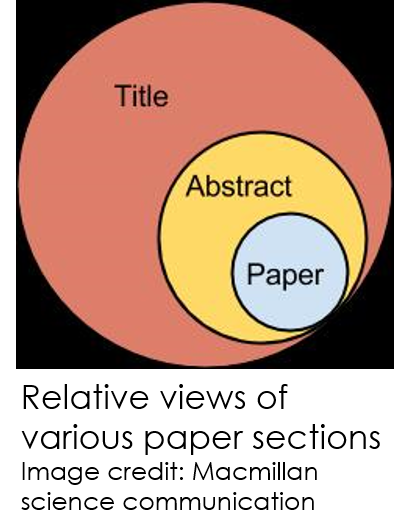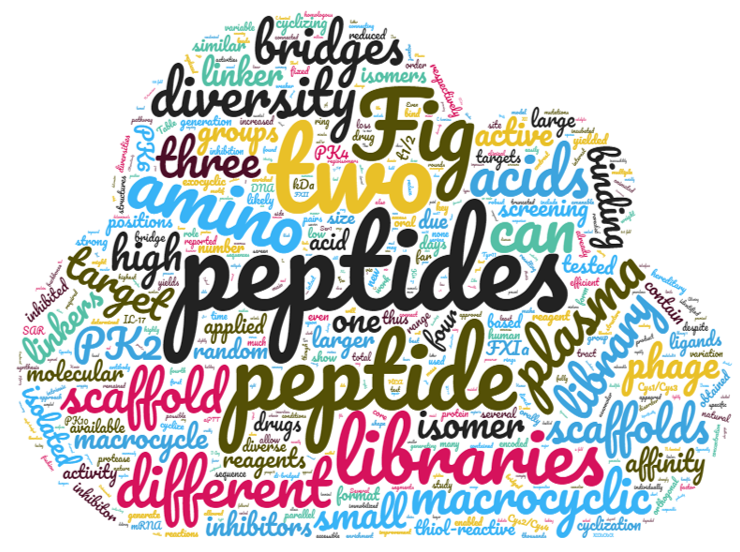At a recent workshop on manuscript writing, I was very surprised at how many attendees (>25%) said that composing the title was the most difficult or stressful part of writing their manuscript draft.
It’s a bit crazy that 15 words, less than 1% of most manuscripts, can cause so much stress. Though it definitely makes sense it would be such a high-stress component because the title is the best way to interest a reader.
Consider how many more people read the title than the abstract or the paper:

Therefore, I assume most of you also suffer from the same grief as my workshop attendees when writing a manuscript title, so we’ll go over the key components of a title in our latest post.
Three key parts of a title
- Keywords
- Emphasis
- Impact
These three main components, described in detail below, should all be included in any good title.
These key parts might overlap, ie., certain words might cover more than one of these categories, though all of the parts still need to be there.
So what does each part entail?
1. Keywords
It makes sense that the keywords in your paper need to be included in the title, though it can be hard to find these.
How to find keywords
What words would YOU use, as an expert in the field, to search for this paper?
You definitely know what you are doing. How would YOU search for this research?
What words would make your paper stand out from other similar papers in your field?
What differences are there between your work and your competition? What makes your paper stand out?
What words do you use frequently in this paper?
To discover this, go to a website like www.wordclouds.com and input the text of your paper.
What keywords does it show, ie., what words do you use constantly in the paper?
As an example, look at the word cloud from this paper [Nature Chemistry volume 10, pages 715–723 (2018)]:
Cyclization of peptides with two chemical bridges affords large scaffold diversities

Looking again at the title, highlighting the keywords that are found in the word cloud, we see:
Cyclization of peptides with two chemical bridges affords large scaffold diversities
So many of the keywords found in the word cloud are in the paper. What important words are very common that are not in title, though?
What about: library/libraries, phage?
Changing this title to one of the two following can bring in an additional important keyword that might be able to increase the impact of the paper:
Libraries of peptides cyclized with two chemical bridges afford large scaffold diversities
Peptides cyclized using two chemical bridges afford phage libraries with diverse scaffolds
Are there words in the title of your draft that are NOT keywords?
It is fine if these words are there, but you need to ask yourself WHY.
WHY do you need words that are not keywords?
Do they clarify a point or make it readable?
If not, are they needed?
Are terms written in such a way as to be accessible to your target audience?
This is a key point that is often overlooked in paper writing.
Your target audience depends very strongly on what journal you are shooting for, and should definitely change between a highly specialized journal in your field and a high-level journal with a broad audience.
Will ALL of the readers of your target journal be able to understand the title you have chosen?
For example, readers of a neuropharmacology journal might understand “5-HT receptors”, but for a journal with a broader audience, “seratonin receptors” will be better for the title.
2. Emphasis
Will the reader know what type of study you conducted by reading your title?
For example, did you do basic research, create a new method, build on a previous method, find a new application for existing research, create a new highly applicable technique, etc?
Giving an idea of what type of research this was will help attract the right readers to your study.
For example
In the title example I showed above, the emphasis is underlined:
Libraries of peptides cyclized with two chemical bridges afford large scaffold diversities
Peptides cyclized using two chemical bridges afford phage libraries with diverse scaffolds
Notice that these words were the ones I suggested adding to the title based on the word cloud – these key words are important for indicating the emphasis of the paper.
3. Impact
There are a few ways in which you can indicate the impact of your research in a way that can attract a reader.
To figure out what your impact might be:
Have you indicated why your reader might want to read your paper?
What might be new in your research that would interest a reader?
What is different from previous research or your competition?
How does this work affect your field?
For example
In the title examples I showed above, the impact is underlined:
Libraries of peptides cyclized with two chemical bridges afford large scaffold diversities
Note that the underlined words here are also some of the keywords, and these indicate how this research differentiates the huge field of peptide libraries and what is different in this study.
Putting it all together
You title should be 10-15 words.
Most journals limit you to 15 words, and titles less than 10 words often do not provide the reader with enough information.
Each title will be a bit different, though once you brainstorm the answers to the above questions, figure out what the key points are that you will want to present to your reader to determine how to narrow down the word count.
Once you have a draft title, remember the importance of making the title accessible to ALL of the readers of your key journal, and try to adapt the words to the level of the audience.
Finally, will this help you draft your next title?
What other strategies might you use to determine what to include?

